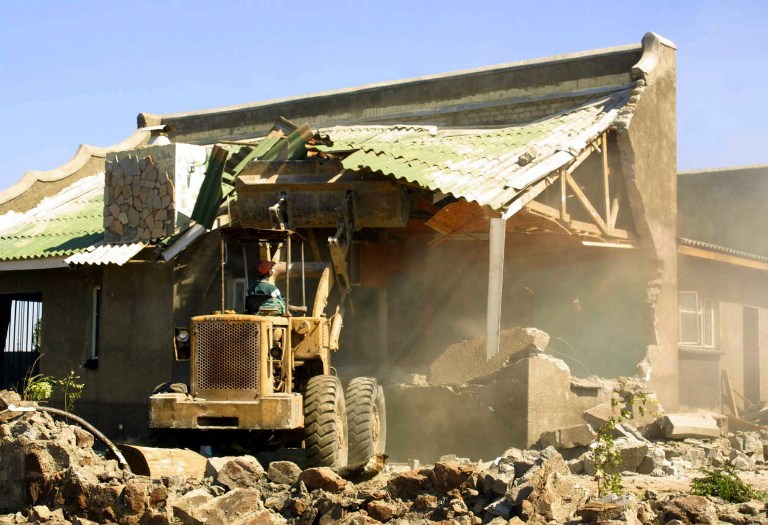19 May 2015 marks 10 years since the Government of Zimbabwe’s programme of mass forced evictions, locally know as Operation Murambatsvina (Operation Drive Out Rubbish). According to the United Nations, some 750 000 people lost their homes and businesses in the widely-condemned programme. Ten years on, the affected people have not accessed effective remedies, have not been compensated for their loss and thousands allocated plots of land under the Operation Garikai/Hlalani kuhle (Good living) live in settlements with no basic services, schools, clinics and were driven deeper into poverty. Farai Machena* had his home destroyed. Here, he shares his own experience.

Operation Murambatsvina started on 19 May 2005 in other areas, but reached our settlement of Hatcliffe Extension on 27 May. On that sad day, state security agents moved into our community and physically removed my family from our home before pulling down the structure we had built. We had been living in Hatcliffe Extension since 1993. My home was destroyed by the government despite the fact that it had actually settled us there. We had a lease agreement officially recognising our occupation of the property.
After our homes were destroyed we were left in the open for days during the beginning of Zimbabwean winter. We were later taken to a holding camp at Caledonia Farm on the outskirts of Harare where life was terrible – the services were extremely stretched, children dropped out of school, we did not have enough food, shelter or toilets.
Operation Murambatsvina marked the beginning of a new phase in our lives. It started with promises by the government for a better life under Operation Garikai. Government promised to build better houses. However, most of us ended up in tents. The government gave us four wooden poles and four metal roofing sheets. From these we were supposed to rebuild our destroyed homes. To add pain to injury, government said we had been evicted in error since we had Lease Agreements. We were told that we could go back to the same plots that our homes had been destroyed. Well-wishers gave us plastic material to construct shelter with. All privacy was lost as family members shared the little living space.
The situation has not improved 10 years on. We are still languishing in extreme poverty, surviving from hand to mouth. The majority of the over 20 000 people living in Hatcliffe Extension have no source of income. Operation Murambatsvina made worse an already desperate situation.
Operation Murambatsvina robbed us of our sources of livelihood. Today development or progress in our beloved mud city, Hatcliffe Extension, as it is affectionately known, is non-existent.
Lost hope
Despite the existence of a national housing policy and a Constitution that prohibits arbitrary evictions, we continue to live with the fear of another forced eviction.
I cannot stop thinking of what my community lost. Living in an independent Zimbabwe, I am yet to enjoy any benefits of independence. My education was disrupted by the forced evictions. Our lives have not improved. All I know is suffering. I have to struggle for everything.
During Operation Murambatsvina, despite the destruction and the accompanying suffering, we actually had some flicker of hope. For a moment we thought that it was just a matter of time before our longtime dream of adequate housing was fully realised. Little did we knew that it was like that moment after a long walk in a desert that you lift up your head and see something you mistake for an oasis, you gather your last strength thinking that you will soon quench your thirst only to realise that it was something else.
The forced eviction has also exposed young people in my community to exploitation. As a young person living in Hatcliffe Extension I feel that people are not being afforded the opportunity to participate in development issues that affect our community. We have become victims of exploitation from opportunistic political parties, politicians and pseudo-development agents who masquerade as liberators of the youth.
Young people’s voices are ignored resulting in disempowerment. The situation of young people makes me recall Paulo Freire, who says ‘to liberate the oppressed without their reflective participation in the act of liberation (is equivalent) to treating them as objects which must be saved from a burning building; it is to lead them into the populist pitfall and transform them into masses which can be manipulated.”
As young people in Hatcliffe Extension we want to participate in our community on an equal footing with other stakeholders. We were all affected by the forced evictions. We have the passion, zeal, enthusiasm, and a deep motivation to transform our situation. There is no dignity in begging. We want to be able to support our own families.
*not his real name
Amnesty International has been campaigning against mass forced evictions in Zimbabwe since 2005. We are campaigning for effective remedies for the survivors, including access to basic services such as healthcare and education.
